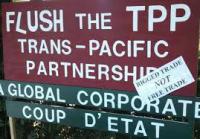As popular opposition grows in Europe to the proposed Transatlantic Trade and Investment Partnership (TTIP) between the European Union (EU) and the United States of America (USA), so many Australians oppose a similar Trans-Pacific Partnership trade agreement. The Australian online activist group GetUp! is running a campaign, calling it "The scariest treaty you've never heard of”.
By signing the TPP, Australia risks permanently shifting
the power to protect our environment away from our Australians and towards
corporations. Corporations will be allowed to sue our governments for 'loss
of profits' when they're prevented from destroying our natural heritage – even
in cases where it would clearly be catastrophic to allow it.
There are already cases of this happening elsewhere under similar trade
agreements. When Quebec placed a ban on dangerous fracking processes in a local
river, a foreign-owned energy company filed a $250 million lawsuit against the
Canadian government.2
The (Australian) Abbott Government can still walk away, or reject the parts of
the deal that hurt Australia's national interest – but without public pressure,
who knows what kind of agreement they'll sign on to? Most people haven't even
heard of the TPP – but we can change that. Let's show Minister Robb
we're watching, and let our government know that our environment won't be sold
out for corporate profits.
Now's the time to speak out against the TPP and urge Prime
Minister Abbott and Minister Robb not to sign the dotted line.
Let's make some noise: http://www.getup.org.au/tpp-environment
Want to know more?
It's already happening in El Salvador, where a Canadian company is suing the government for $315 million in "loss of future profits" because local citizens won a hard-fought campaign against a gold mine that threatened to contaminate their water supplies.
It's happening in Argentina, where the government imposed a freeze on water and energy bills during the GFC and was sued by an international utilities company.
It's even happening in Canada, where American pharmaceutical company Eli Lilly is demanding $500 million in compensation — as well as changes to Canadian patent laws — because courts revoked two of its patents for lack of evidence around the drugs' supposed benefits.
For more on the potential dangers of ISDS provisions, see ABC Radio National's story here.
~ References ~
[1] 'Hostile Environment: TPP Green Chapter "Virtually Meaningless"',
Michael Safi, The Global Mail. 16 January 2014.
[2] 'U.S. firm to launch NAFTA challenge to Quebec fracking ban' Globe and
Mail. 15 November 2012.


